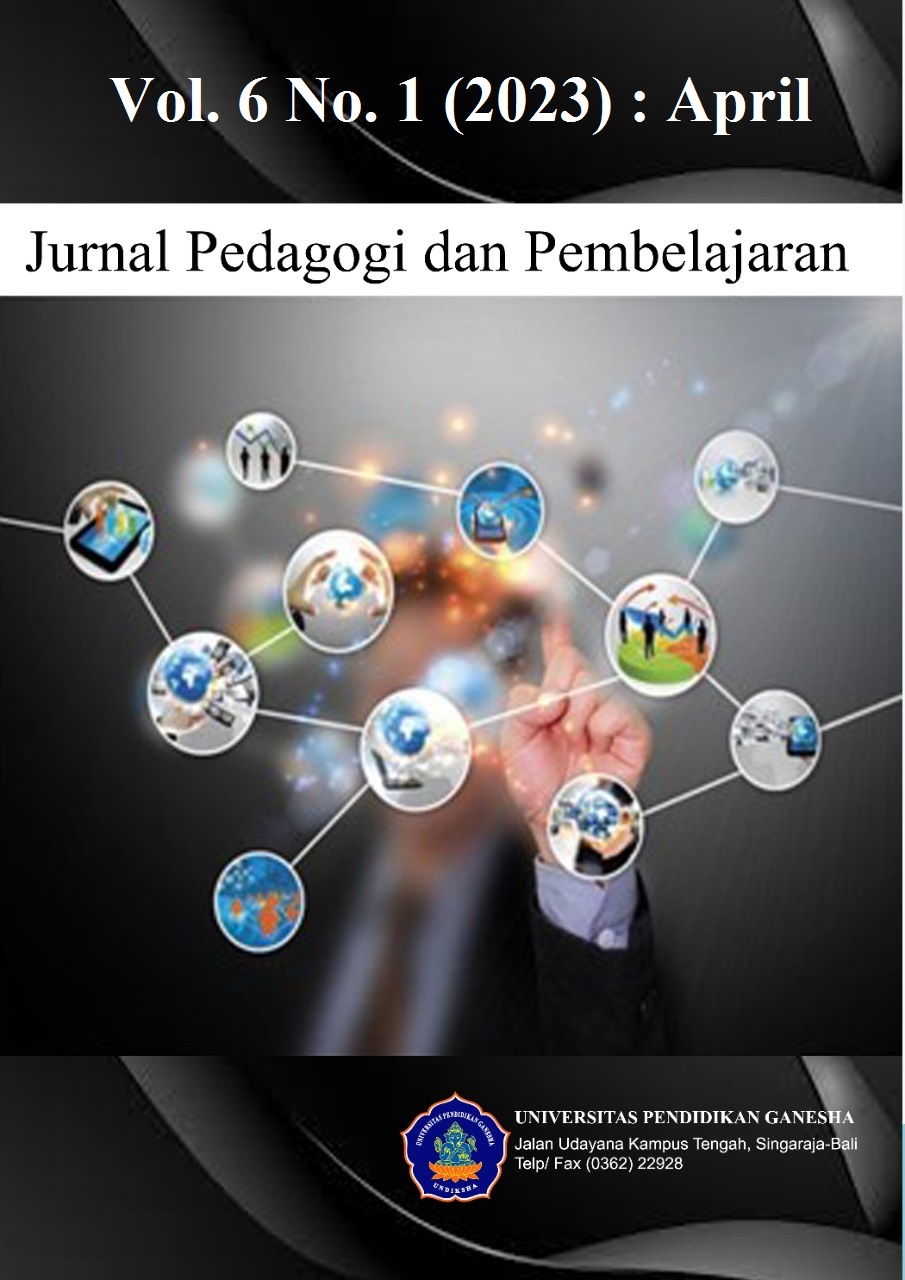Self-Efficacy Scales In Online Learning: Construction And Validation
DOI:
https://doi.org/10.23887/jp2.v6i1.53932Keywords:
Online Learning, Instruments, Self-EfficacyAbstract
Low enthusiasm and student learning outcomes during the online learning process are influenced by several factors, one of which is the self-efficacy factor. The reality on the ground shows that teachers have not been able to measure students' self-efficacy level during the online learning process, so this research was conducted to develop and validate items that assess four sources of self-efficacy in online learning. This research belongs to the type of development research carried out through the literature review stage, deriving instrument items, testing instruments on samples, selecting instrument items, and analyzing the reliability and validity of the instrument. The subjects involved in this research were one expert in educational evaluation, one in online learning, and 176 students. Data collection in the study was carried out using the non-test method, with research instruments in the form of instrument validity sheets and student self-efficacy questionnaires. The data obtained in the study were then analyzed by testing the validity and reliability of the instrument items using partial least squares (PLS) analysis. The research analysis results show that the instrument developed has achieved valid and reliable values for thirteen items on self-efficacy measurement in online learning, so this instrument can be used in research involving self-efficacy as a variable that has shown four sources/dimensions of self-efficacy.
References
Afifah, S. N., & Kusuma, A. B. (2021). Pentingnya Kemampuan Self-Efficacy Matematis Serta Berpikir Kritis Pada Pembelajaran Daring Matematika. Jurnal Mathedu (Mathematic Education Journal), 4(2), 313–320. https://doi.org/10.37081/mathedu.v4i2.2642. DOI: https://doi.org/10.37081/mathedu.v4i2.2642
Agustiningtyas, P., & Surjanti, J. (2021). Peranan Teman Sebaya dan Kebiasaan Belajar Terhadap Hasil Belajar Melalui Motivasi Belajar Di Masa Covid-19. Edukatif : Jurnal Ilmu Pendidikan, 3(3), 794–805. https://doi.org/10.31004/edukatif.v3i3.454. DOI: https://doi.org/10.31004/edukatif.v3i3.454
Aldiyah, E. (2021). Perubahan Gaya Belajar Di Masa Pandemi Covid-19. Cendekia: Jurnal Ilmu Pengetahuan, 1(1), 8–16. https://doi.org/10.51878/cendekia.v1i1.24. DOI: https://doi.org/10.51878/cendekia.v1i1.24
Bulfone, G., Vellone, E., Maurici, M., Macale, L., & Alvaro, R. (2020). Academic self‐efficacy in Bachelor‐level nursing students: Development and validation of a new instrument. Journal of Advanced Nursing, 76(1), 398–408. https://doi.org/10.1111/jan.14226. DOI: https://doi.org/10.1111/jan.14226
Dewi, M. W. K., & Nuraeni, R. (2022). Kemampuan Komunikasi Matematis Siswa SMP ditinjau dari Self-Efficacy pada Materi Perbandingan di Desa Karangpawitan. Plusminus: Jurnal Pendidikan Matematika, 2(1), 151–164. https://doi.org/10.31980/plusminus.v2i1.1586. DOI: https://doi.org/10.31980/plusminus.v2i1.1586
Ferdyansyah, A., Rohaeti, E. E., & Suherman, M. M. (2020). Gambaran Self Efficacy Siswa Terhadap Pembelajaran. Fokus (Kajian Bimbingan & Konseling Dalam Pendidikan), 3(1), 16. https://doi.org/10.22460/fokus.v3i1.4214. DOI: https://doi.org/10.22460/fokus.v3i1.4214
Gómez, D. G., Jeong, J. S., & Cañada-Cañada, F. (2022). Enhancing science self-efficacy and attitudes of Pre-Service Teachers (PST) through a flipped classroom learning environment. Interactive Learning Environments, 30(5), 896–907. https://doi.org/10.1080/10494820.2019.1696843. DOI: https://doi.org/10.1080/10494820.2019.1696843
Hadiat, H. L., & Karyati, K. (2019). Hubungan kemampuan koneksi matematika, rasa ingin tahu dan self-efficacy dengan kemampuan penalaran matematika. Jurnal Riset Pendidikan Matematika, 6(2), 200–210. https://doi.org/10.21831/jrpm.v6i2.26552. DOI: https://doi.org/10.21831/jrpm.v6i2.26552
Hendriana, H., & Kadarisma, G. (2019). Self-Efficacy dan Kemampuan Komunikasi Matematis Siswa SMP. JNPM (Jurnal Nasional Pendidikan Matematika), 3(1), 153. https://doi.org/10.33603/jnpm.v3i1.2033. DOI: https://doi.org/10.33603/jnpm.v3i1.2033
Lau, C., Kitsantas, A., Miller, A. D., & Drogin Rodgers, E. B. (2018). Perceived responsibility for learning, self-efficacy, and sources of self-efficacy in mathematics: a study of international baccalaureate primary years programme students. Social Psychology of Education, 21(3), 603–620. https://doi.org/10.1007/s11218-018-9431-4. DOI: https://doi.org/10.1007/s11218-018-9431-4
Lestari, A. (2021). Strategi Mahasiswa dalam Meningkatkan Minat Belajar, Self-Efficacy, Self Regulated pada Pembelajaran Daring di Masa Pandemi Covid-19. Didaktis: Jurnal Pendidikan Dan Ilmu Pengetahuan, 21(3). https://doi.org/10.30651/didaktis.v21i3.10019. DOI: https://doi.org/10.30651/didaktis.v21i3.10019
Muawanah, E. I., & Muhid, A. (2021). Strategi Meningkatkan Motivasi Belajar Siswa Selama Pandemi Covid – 19 : Literature Review. Jurnal Ilmiah Bimbingan Konseling Undiksha, 12(1). https://doi.org/10.23887/jjbk.v12i1.31311. DOI: https://doi.org/10.23887/jjbk.v12i1.31311
Ningrum, P., & Rahmawati, R. D. (2021). Pengaruh Self Efficacy Terhadap Prestasi Belajar Matematika Siswa SD Dalam Pembelajaran Daring. Prima Magistra: Jurnal Ilmiah Kependidikan, 3(1), 41–47. https://doi.org/10.37478/jpm.v3i1.1394. DOI: https://doi.org/10.37478/jpm.v3i1.1394
Novrianto, R., Marettih, A. K. E., & Wahyudi, H. (2019). Validitas Konstruk Instrumen General Self Efficacy Scale Versi Indonesia. Jurnal Psikologi, 15(1), 1. https://doi.org/10.24014/jp.v15i1.6943. DOI: https://doi.org/10.24014/jp.v15i1.6943
Pane, A., & Dasopang, M. D. (2017). Belajar Dan Pembelajaran. Fitrah:Jurnal Kajian Ilmu-Ilmu Keislaman, 3(2), 333. https://doi.org/10.24952/fitrah.v3i2.945. DOI: https://doi.org/10.24952/fitrah.v3i2.945
Robandi, D., & Mudjiran, M. (2020). Dampak Pembelajaran Dari Masa Pandemi Covid-19 terhadap Motivasi Belajar Siswa SMP di Kota Bukittinggi. Jurnal Pendidikan Tambusai, 4(3), 3498–3502. https://doi.org/10.31004/jptam.v4i3.878. DOI: https://doi.org/10.31004/jptam.v4i3.878
Saputro, A. A. (2021). Pengaruh Self-Efficacy Terhadap Setres Mahasiswa Dalam Pembelajaran Jarak Jauh Selama Pandemi. Jurnal Porkes, 4(2), 81–86. https://doi.org/10.29408/porkes.v4i2.4369. DOI: https://doi.org/10.29408/porkes.v4i2.4369
Saumi, N. N., Murtono, M., & Ismaya, E. A. (2021). Peran Guru Dalam Memberikan Motivasi Belajar Siswa Sekolah Dasar Pada Masa Pandemi Covid-19. Jurnal Educatio FKIP UNMA, 7(1), 149–155. https://doi.org/10.31949/educatio.v7i1.892. DOI: https://doi.org/10.31949/educatio.v7i1.892
Slater, E. V., & Main, S. (2020). A measure of classroom management: validation of a pre-service teacher self-efficacy scale. Journal of Education for Teaching, 46(5), 616–630. https://doi.org/10.1080/02607476.2020.1770579. DOI: https://doi.org/10.1080/02607476.2020.1770579
Stephen, J. S., & Szapkiw, A. R. (2021). A high-impact practice for online students: the use of a first-semester seminar course to promote self-regulation, self-direction, online learning self-efficacy. Smart Learning Environments, 8(1), 6. https://doi.org/10.1186/s40561-021-00151-0. DOI: https://doi.org/10.1186/s40561-021-00151-0
Sujana, I. W. C. (2019). Fungsi Dan Tujuan Pendidikan Indonesia. Adi Widya: Jurnal Pendidikan Dasar, 4(1), 29. https://doi.org/10.25078/aw.v4i1.927. DOI: https://doi.org/10.25078/aw.v4i1.927
Syachtiyani, W. R., & Trisnawati, N. (2021). Analisis Motivasi Belajar Dan Hasil Belajar Siswa Di Masa Pandemi Covid-19. Prima Magistra: Jurnal Ilmiah Kependidikan, 2(1), 90–101. https://doi.org/10.37478/jpm.v2i1.878. DOI: https://doi.org/10.37478/jpm.v2i1.878
Tafdhila, T., & Marleni, L. (2021). Pengaruh Pembelajaran Daring Terhadap Motivasi Belajar Di Masa Pandemi Covid 19 Pada Mahasiswa Keperawatan STIK Siti Khadijah Palembang. Jurnal Perawat Indonesia, 5(1). https://doi.org/10.32584/jpi.v5i1.832. DOI: https://doi.org/10.32584/jpi.v5i1.832
Taufik, T., & Komar, N. (2022). Hubungan Self Efficacy Terhadap Peningkatan Motivasi Belajar Dan Hasil Belajar Matematika Siswa Di Sekolah. Andragogi: Jurnal Pendidikan Islam Dan Manajemen Pendidikan Islam, 3(2), 183–200. https://doi.org/10.36671/andragogi.v3i2.220. DOI: https://doi.org/10.36671/andragogi.v3i2.220
Ulpah, M. (2019). Self-Efficacy Dalam Pembelajaran Matematika Siswa Madrasah Aliyah. Jurnal Pemikiran Alternatif Kependidikan, 24(1), 167–176. https://doi.org/10.24090/insania.v24i1.2808. DOI: https://doi.org/10.24090/insania.v24i1.2808
Yavuzalp, N., & Bahçivan, E. (2020). The Online Learning Self-Efficacy Scale: Its Adaptation into Turkish and Interpretation According to Various Variables. Turkish Online Journal of Distance Education, 1(1), 31–44. https://doi.org/10.17718/tojde.674388. DOI: https://doi.org/10.17718/tojde.674388
Downloads
Published
How to Cite
Issue
Section
License
Copyright (c) 2023 Suci Nurhayati

This work is licensed under a Creative Commons Attribution-ShareAlike 4.0 International License.
Authors who publish with Jurnal Pedagogi dan Pembelajaran agree to the following terms:- Authors retain copyright and grant the journal the right of first publication with the work simultaneously licensed under a Creative Commons Attribution License (CC BY-SA 4.0) that allows others to share the work with an acknowledgment of the work's authorship and initial publication in this journal
- Authors are able to enter into separate, additional contractual arrangements for the non-exclusive distribution of the journal's published version of the work (e.g., post it to an institutional repository or publish it in a book), with an acknowledgment of its initial publication in this journal.
- Authors are permitted and encouraged to post their work online (e.g., in institutional repositories or on their website) prior to and during the submission process, as it can lead to productive exchanges, as well as earlier and greater citation of published work. (See The Effect of Open Access)










